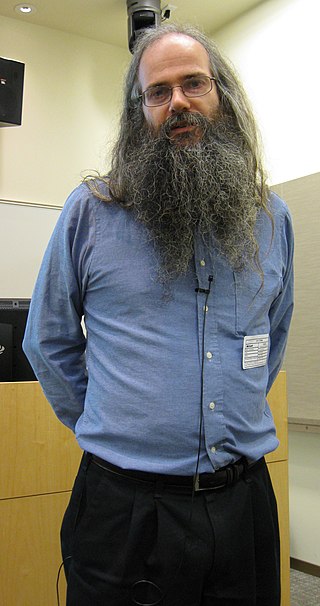
Carnegie Mellon University (CMU) is a private research university in Pittsburgh, Pennsylvania. The institution was originally established in 1900 by Andrew Carnegie as the Carnegie Technical Schools. In 1912, it became the Carnegie Institute of Technology and began granting four-year degrees. In 1967, it became the current-day Carnegie Mellon University through its merger with the Mellon Institute of Industrial Research, founded in 1913 by Andrew Mellon and Richard B. Mellon and formerly a part of the University of Pittsburgh.

The Carnegie Mellon University College of Engineering is the academic unit that manages engineering research and education at Carnegie Mellon University. The College can trace its origins from Andrew Carnegie's founding of the Carnegie Technical Schools. Today, The College of Engineering has seven departments of study.

The Heinz College of Information Systems and Public Policy, also known as Heinz College, is the public policy and information college of Carnegie Mellon University in Pittsburgh, Pennsylvania. It consists of the School of Information Systems and Management and the School of Public Policy and Management. The college is named after CMU's former instructor and the later U.S. Senator John Heinz from Pennsylvania.

The School of Computer Science (SCS) at Carnegie Mellon University in Pittsburgh, Pennsylvania, US is a school for computer science established in 1988. It has been consistently ranked among the top computer science programs over the decades. As of 2022 U.S. News & World Report ranks the graduate program as tied for second with Stanford University and University of California, Berkeley. It is ranked second in the United States on Computer Science Open Rankings, which combines scores from multiple independent rankings.

Dabbala Rajagopal "Raj" Reddy is an Indian-born American computer scientist and a winner of the Turing Award. He is one of the early pioneers of artificial intelligence and has served on the faculty of Stanford and Carnegie Mellon for over 50 years. He was the founding director of the Robotics Institute at Carnegie Mellon University. He was instrumental in helping to create Rajiv Gandhi University of Knowledge Technologies in India, to cater to the educational needs of the low-income, gifted, rural youth. He was the founding chairman of International Institute of Information Technology, Hyderabad. He is the first person of Asian origin to receive the Turing Award, in 1994, known as the Nobel Prize of Computer Science, for his work in the field of artificial intelligence.

The Robotics Institute (RI) is a division of the School of Computer Science at Carnegie Mellon University in Pittsburgh, Pennsylvania, United States. A June 2014, the article in Robotics Business Review magazine calls it "the world's best robotics research facility" and a "pacesetter in robotics research and education."

Carnegie Mellon Silicon Valley is a degree-granting branch campus of Carnegie Mellon University located in the heart of Silicon Valley in Mountain View, California. It was established in 2002 at the NASA Ames Research Center in Moffett Field.
The Department of Social and Decision Sciences (SDS) is an interdisciplinary academic department within the Dietrich College of Humanities and Social Sciences at Carnegie Mellon University. The Department of Social and Decision Sciences is headquartered in Porter Hall in Pittsburgh, Pennsylvania and is led by Department Head Gretchen Chapman. SDS has a world-class reputation for research and education programs in decision-making in public policy, economics, management, and the behavioral social sciences.

The University of Pittsburgh School of Medicine is a medical school of the University of Pittsburgh, located in Pittsburgh, Pennsylvania. The School of Medicine, also known as Pitt Med, encompasses both a medical program, offering the doctor of medicine, and graduate programs, offering doctor of philosophy and master's degrees in several areas of biomedical science, clinical research, medical education, and medical informatics.

The University of Pittsburgh School of Health and Rehabilitation Sciences is located in Pittsburgh, Pennsylvania.

Carnegie Mellon University in Australia has been the Australian campus of Carnegie Mellon University's H. John Heinz III College established in 2006 in the city centre of Adelaide, South Australia.

The School of Design at Carnegie Mellon University is a degree-granting institution within a private university in Pittsburgh, Pennsylvania, United States. The School of Design is one of five schools within the Carnegie Mellon College of Fine Arts offering both under and post graduate education. The School is accredited by Middle States Association of Colleges and Schools and awards BDES, MA, MDES, MPS, MII-PS, DDES, and PhD degrees. The School of Design has 21 full-time and 10 adjunct faculty.

The Human–Computer Interaction Institute (HCII) is a department within the School of Computer Science at Carnegie Mellon University (CMU) in Pittsburgh, Pennsylvania. It is considered one of the leading centers of human–computer interaction research, and was named one of the top ten most innovative schools in information technology by Computer World in 2008. For the past three decades, the institute has been the predominant publishing force at leading HCI venues, most notably ACM CHI, where it regularly contributes more than 10% of the papers. Research at the institute aims to understand and create technology that harmonizes with and improves human capabilities by integrating aspects of computer science, design, social science, and learning science.

Alan W Black is a Scottish computer scientist, known for his research on speech synthesis. He is a professor in the Language Technologies Institute at Carnegie Mellon University in Pittsburgh, Pennsylvania.

Jaime Guillermo Carbonell was a computer scientist who made seminal contributions to the development of natural language processing tools and technologies. His extensive research in machine translation resulted in the development of several state-of-the-art language translation and artificial intelligence systems. He earned his B.S. degrees in Physics and in Mathematics from MIT in 1975 and did his Ph.D. under Dr. Roger Schank at Yale University in 1979. He joined Carnegie Mellon University as an assistant professor of computer science in 1979 and lived in Pittsburgh from then. He was affiliated with the Language Technologies Institute, Computer Science Department, Machine Learning Department, and Computational Biology Department at Carnegie Mellon.
The Tepper School of Business is the business school of Carnegie Mellon University. It is located in the university's 140-acre (0.57 km2) campus in Pittsburgh, Pennsylvania.

Alexander Waibel is a professor of Computer Science at Carnegie Mellon University and Karlsruhe Institute of Technology. Waibel's research interests focus on speech recognition and translation and human communication signals and systems. Alex Waibel made pioneering contributions to speech translation systems, breaking down language barriers through cross-lingual speech communication. In fundamental research on machine learning, he is known for the Time Delay Neural Network (TDNN), the first Convolutional Neural Network (CNN) trained by gradient descent, using backpropagation. Alex Waibel introduced the TDNN 1987 at ATR in Japan.
Eric Nyberg is a professor in the Language Technologies Institute of the School of Computer Science at Carnegie Mellon University. He is the director for the Master of Computational Data Science.
Angel G. Jordan was a Spanish-born American electronics and computer engineer known as the founder of the Software Engineering Institute (SEI) and co-founder of the Robotics Institute at Carnegie Mellon University (CMU) and served on its faculty for 55 years, since 2003 as Emeritus. He was instrumental in the formation of the School of Computer Science (SCS) at Carnegie Mellon. He has made contributions to technology transfer and institutional development. He served as Dean of Carnegie Mellon College of Engineering and later as the provost of Carnegie Mellon University.

Hideto Tomabechi is a Japanese cognitive scientist computer scientist.

















